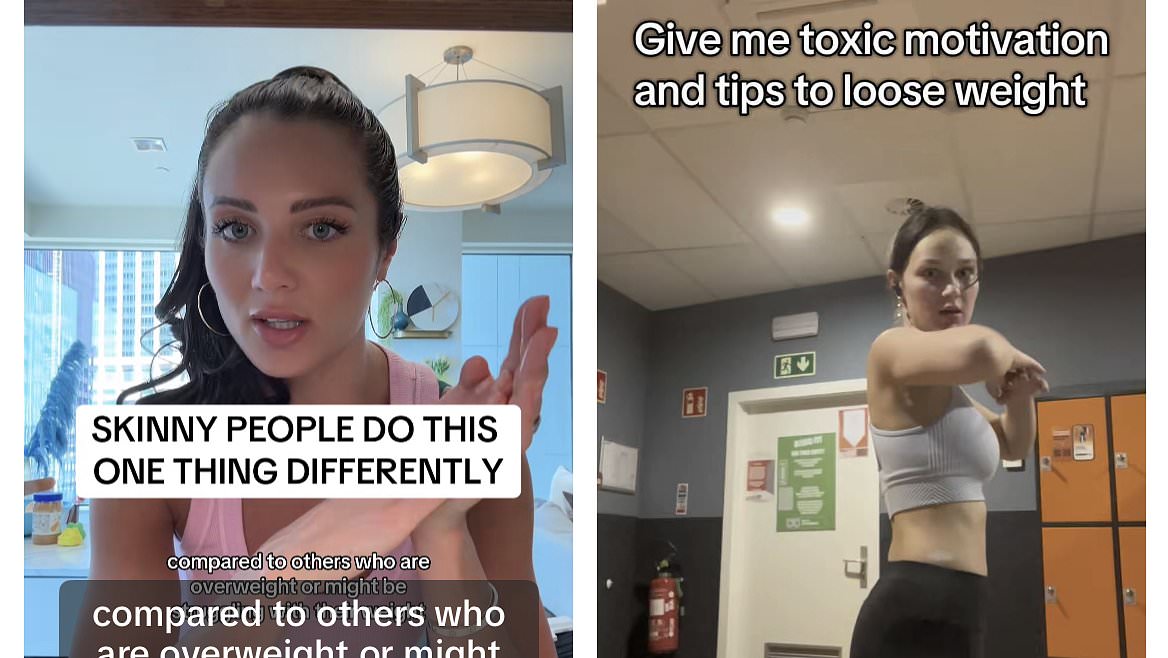‘Don’t reward yourself with food, you’re not a dog’ is one of many so-called affirmations currently sweeping the internet.
Snappy phrases, inspired by Kate Moss’ controversial catchphrase ‘nothing tastes as good as skinny feels’, have become synonymous with restrictive diets being promoted on social media under the hashtag ‘SkinnyTok’.
And while the body positivity movement of the 2010s sought to celebrate diverse bodies, it seems Gen Z has become consumed by ‘glow-up culture’ reminiscent of the 90s.
Hiding behind a facade of gleaming exercise gear and Tupperware salads, the hashtag associated with more than half a million posts on TikTok promote 1000-calorie diets and extreme exercise challenges.
Sophia Healy, who struggled with anorexia for six years, said social media helped fuel her eating disorder – and fears this will have a similar impact on young girls.
The 27-year-old told : ‘Social media 100 per cent glamorises it.
‘You get some girls on TikTok talking about staying skinny and what they eat to stay skinny, like being skinny is the be-all and end-all, you have to be skinny to be happy.
‘And then you get other people that constantly show what they eat in a day but it’s the bare minimum thing but obviously you see it as a consumer and think I’ve got to eat like them to look like them.
‘There was a time where curvy was considered “better”. I followed influencers who were preaching body positivity and now they’ve suddenly got really skinny.
‘Everyone’s back on the “skinny’s best” mindset.’
Ms Healy said nowadays she tries to avoid interacting with accounts that glamorise disordered eating, but that wasn’t easy while in the thick of her illness.
‘It got worse in lockdown from seeing everything on social media. It’s very glamorised to be very very thin and not eat a lot,’ she explained.
‘We didn’t have much to do except be on social media and everyone was losing weight.
‘But they’re not showing your hair falling out or being unable to move your body because you’re so unwell.
‘I only started to get better when someone told me I would genuinely die.’
There is nothing new about women’s bodies becoming part of a trend cycle, but as celebrities shrink and promote weight loss aids such as Ozempic, influencers captivate audiences by eating ‘carnivore diets’ while unsubtly showing off their stick-thin bodies.
Hashtag WIEIAD (what I eat in a day) is attached to over 800k videos on TikTok alone and hidden within most videos are young girls selling a new protein powder or diet to their audience.
Umairah Malik, clinical manager for Beat Eating Disorders, the UK’s eating disorder charity said they’re well aware of content that actively encourages or glamorises disordered eating.
‘It’s definitely concerning we often hear from people with eating disorders who talk about how social media is harmful in the context of their eating disorder,’ Ms Malik explained.
‘And that might be someone who’s vulnerable or someone who already has an eating disorder or has perhaps had one in the past.’
‘It certainly seems to be becoming more and more common and that might be content that actively encourages an eating disorder, the darker side of those online spaces that actively promote eating disorders in the past that’s been referred to as “pro-ana, pro-anoerexia” content.
‘And that’s where people provide tips on how to engage in harmful behaviour.
‘Alongside that content, there’s content about diet culture, fitness and weight loss and when that’s viewed in high volumes, then people describe that as being harmful as well.’
And it seems that even those looking to avoid harmful content relating to disordered eating struggle.
Anna Sorrentino, a 22-year-old student who struggled with an eating disorder said she sometimes views what has been coined ‘recovery’ accounts – where those who are allegedly recovering from an eating disorder post their diets.
‘It does do more harm than good,’ she explained. ‘Because the algorithm knows you so well it knows what you want to see, there’s no escaping it.’
Ms Sorrentino said she thinks social media validated and encouraged her eating disorder.
‘The main reason why it’s such an epidemic is because eating disorders are so competitive and it creates an anonymous platform for people to post their “accomplishments”.
‘If I see a really graphic video of someone really skinny I know that’s not the goal so I know to report the image but a lot of people eat it up and love to see that kind of thing.
‘So they like the content and they can see more of it so they can maybe be reminded of it.’
She explained that having struggled with disordered eating from the age of 12, she is ‘terrified’ of what exposure to eating disorder content will do to young people.
In France, the government is seeking to take action against TikTok group for promoting such content.
Their minister for digital media, Clara Chappaz has reported SkinnyTok to the country’s audiovisual and digital watchdog and the EU.
Ms Chappaz has highlighted concerns over the trend, suggesting it is encouraging people to develop an eating disorder.
While the UK is yet to crackdown on the specific trend, the Advertising Standards Authority (ASA) has launched a crackdown against sellers who promote prescription-only weight-loss jabs and pills online.
Ofcom, the communicatioms regulator has also insisted that young people would have ‘safer online lives’ under its final proposals to tackle legal but harmful content on websites, social media and apps via the landmark Online Safety Act
has contacted TikTok for comment.
